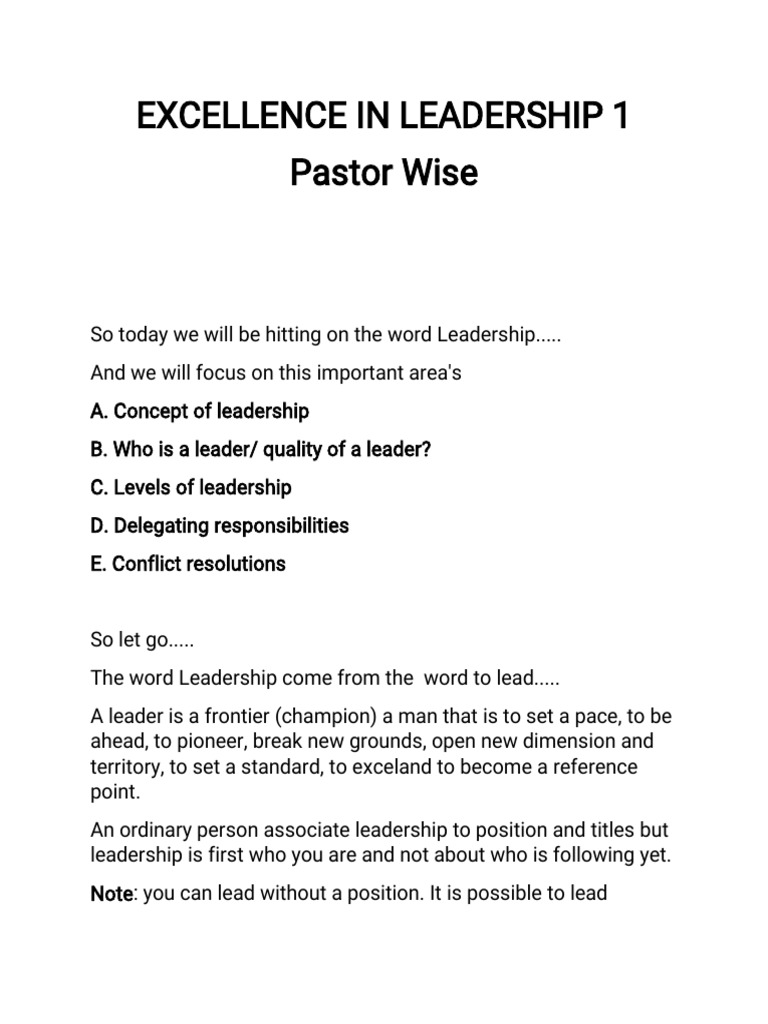The Essence of Leadership
Leadership is not a crown, a prize, or a privilege. It is not a hereditary baton that can be passed on to a self-selected ‘heir apparent’. Nor is leadership about being the best in a given field of activity. Therefore, it follows that leadership is a concept — a thought — whose acceptance by others is the pivot upon which the principle of leadership hinges. “Ah well! I am the leader; I really had to follow them,” said Alexandre Auguste. Those who lead a group of people or an organisation qualify to be labelled as leaders.
As a rarity, leadership qualities are divinely blessed upon a few; invariably, however, they are acquired. The process of acquiring leadership traits is a tedious one. It demands sweat, blood, toil, and, in some cases, tears. Since leadership has long been a subject of awe and romanticism, it remains something coveted by all. There is never a dearth of aspirants for the numero uno position, regardless of the field. From the plains of native leadership to the echelons of political and corporate power, the quest is universal among followers who nurture a desire and urge to become leaders.
Understanding the Concept of Leadership
The word ‘leader’ itself conveys a sense of power beyond its accepted definition. Generally, a person who guides, inspires, and motivates others towards a shared objective is recognised as a leader. This, however, is an extremely narrow view. Leaders must be exceptional individuals, investing in themselves, their qualities, and their characteristics to guide others towards the common good. It is easy to say, but difficult to achieve.
Hereditary leadership has no guarantee of sustainability. In such cases, competence is often disregarded, and persons by virtue of bloodline are catapulted into positions of power. This is rampant in politics. In South Asia, political dynasties have ruled for decades. Both Hasina Wajid and Begum Khaleda Zia were housewives who, by circumstance, rose to become prime ministers. The same applies to the Nehru and Bhutto families. Some proved their leadership through talent, skill, and intellect — Zulfikar Ali Bhutto and Benazir Bhutto are classic examples.
The Illusion of Hereditary Leadership
Hereditary politics is a modern-day replacement for monarchical arrangements, where the offspring of a king or queen automatically assume leadership. It would be incorrect to classify King Charles as a natural leader; as heir to the throne, he was crowned without challenge based on skill or intellect. If he displays any special traits, it is purely coincidental. The crown prince, however incompetent, will still wear the crown — but that does not make him a leader. Eligibility to an office does not mean leadership quality is a given. Poise, judgement, responsibility, and visionary insight cannot be inherited; they must be acquired through hard work and dedication.
The same holds true for family-owned businesses. Leaders made by virtue of ownership, rather than skill or talent, rarely inspire genuine followership.
Leadership in Different Contexts
In politics, it is followers who, by popular vote in a democratic dispensation, select their leader. Such leaders are expected to represent the collective vision and will of the people. They sell hope — dream merchants promising better living conditions. Most fail in the developing world, which is another story. In non-democratic environments, individuals assume power by brute force, proclaiming themselves as messiahs destined to correct social and political ills. Here again, competence is not a prerequisite; leadership is often an illusion created by position.
Leadership in one field does not guarantee capability in another. A sports captain does not automatically qualify to lead beyond their domain. These qualities are tested in narrow contexts; excelling there does not entitle one to lead multitudes.
The Role of Followership
It is the nature of followership that determines leadership status. In corporates, leaders are chosen for a balance between hard skills (technical proficiency) and soft skills (managing human capital). Corporate leaders must demonstrate a strong sense of direction in achieving organisational objectives, for which they are trained.
Most organisations, including family-owned businesses, have formal succession policies outlining selection processes. A few candidates are shortlisted purely on merit. This group, often unknowingly, is put on a ‘fast track’ to acquire skills and invoke innate potential.
However, selecting a few for future leadership can leave others despondent or demotivated, affecting performance — a natural human response. Hence, nomination must be discreet, allowing for visible progress without alienating others. Staff replacement costs are almost always higher than internal promotion.
Developing Future Leaders
In today’s environment, followers must understand and embrace the rationale for change. Leadership is not a contract between equals, but a shared conviction that those deemed best by followers are accepted as leaders.
Many organisations recruit management trainees annually, later selecting the top few for the fast track. These officers are discreetly groomed for specialised training — both vertical and horizontal growth in the management hierarchy. Diversified, hands-on knowledge is critical for leadership. Those without departmental experience will struggle to assume the mantle. The list of qualities required for leadership is exhaustive, but some essentials stand out: character, integrity, purpose, vision, and the ability to inspire trust.
The True Nature of Leadership
Regardless of the arena, those who play to the gallery or flatter board members for nomination know such tactics do not yield long-term success. Leadership emerges only when followers truly connect with the leader’s mission — only then is that connection reinforced.
